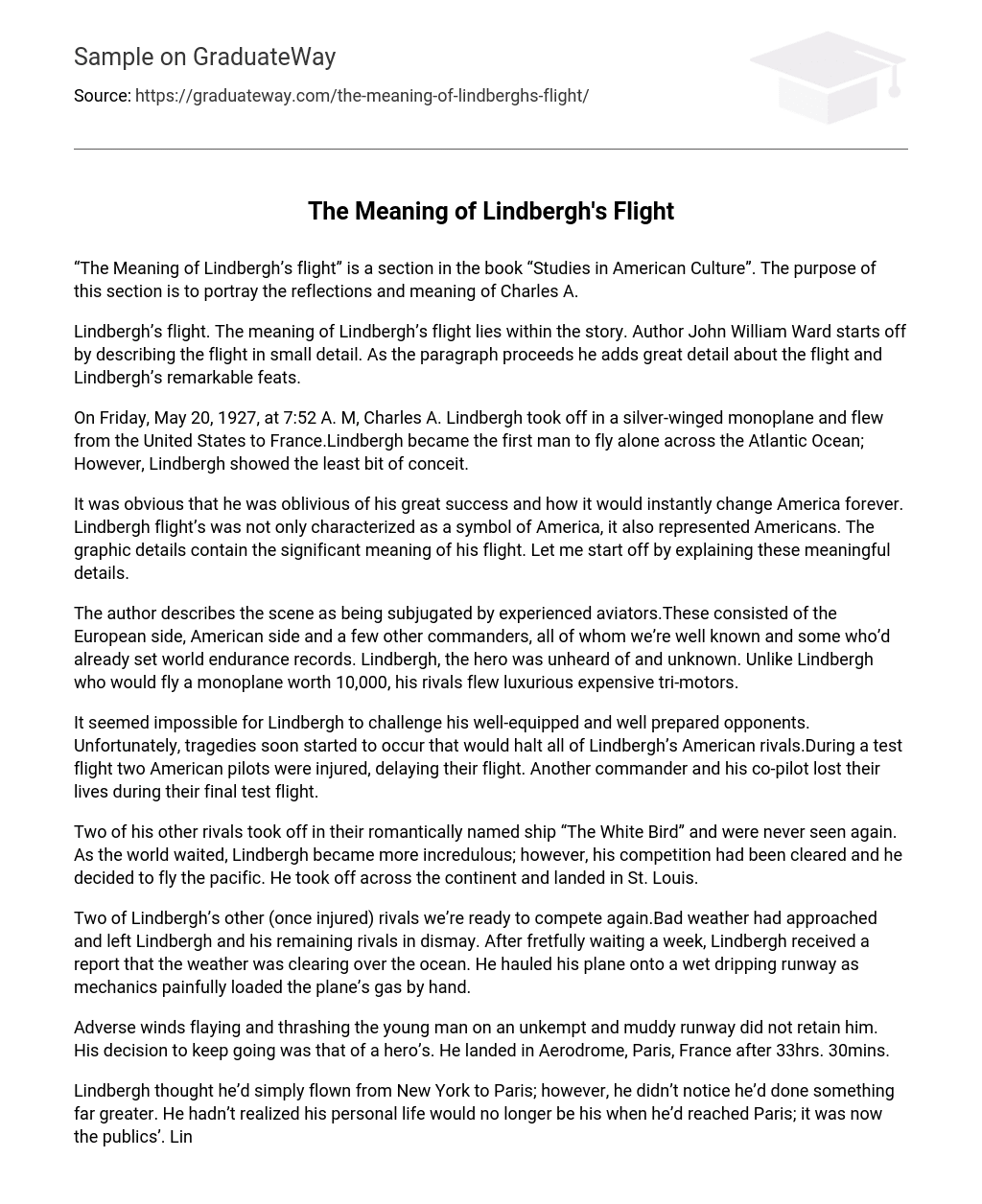“The Meaning of Lindbergh’s flight” can be found in the book “Studies in American Culture”. Its purpose is to illustrate Charles A.’s reflections and the significance of his flight.
The flight of Lindbergh holds its significance in the narrative. In his portrayal, John William Ward initially provides a brief account of the flight. However, as the paragraph progresses, he introduces extensive elaboration on both the flight itself and Lindbergh’s extraordinary accomplishments.
Charles A. Lindbergh set off on a momentous journey on Friday, May 20, 1927, at 7:52 A.M. Departing from the United States in a silver-winged monoplane, he successfully flew to France. This remarkable feat made Lindbergh the first person to solo-cross the Atlantic Ocean. Despite this monumental achievement, Lindbergh remained humble and showed no signs of conceit.
Clearly, he had no idea of the immense impact his accomplishment would have on America. Lindbergh’s flight not only represented the United States, but it also embodied its citizens. The specific details in the visuals carry great significance for his expedition. Let me explain these significant specifics further.
The author depicts a scene dominated by seasoned aviators, including notable individuals from Europe, America, and a few other commanders who had already achieved world endurance records. In contrast, Lindbergh, the hero of the story, was unfamiliar and unknown. While his rivals flew opulent tri-motors, Lindbergh piloted a monoplane valued at 10,000.
Despite the seemingly impossible challenge posed by well-equipped and prepared opponents, Lindbergh’s determination remained unshaken. However, a series of tragic incidents soon unfolded, impacting all of his American rivals. The first incident involved two pilots who were injured during a test flight, resulting in a delay for their own flight. Tragically, another commander and his co-pilot lost their lives while carrying out their final test flight.
Two more competitors of Lindbergh set sail in their ship called “The White Bird” but were never sighted again. As the whole world waited in anticipation, Lindbergh grew even more skeptical. Nevertheless, after his competitors had been eliminated, he made the choice to fly across the Pacific. He departed from the mainland and successfully landed in St. Louis.
Two of Lindbergh’s other competitors, who had previously been injured, were prepared to participate once again. However, they were all disappointed when bad weather arrived. After anxiously waiting for a week, Lindbergh received news that the weather was improving over the ocean. Despite the difficulty, mechanics loaded the plane’s gas manually as Lindbergh dragged his plane onto a wet runway.
Despite adverse winds flaying and thrashing him on an unkempt and muddy runway, the young man demonstrated the determination of a hero by choosing to continue. After enduring 33 hours and 30 minutes, he successfully landed in Aerodrome, Paris, France.
Despite his belief that he had simply traveled from New York to Paris, Lindbergh was oblivious to the fact that he had accomplished something far more momentous. Upon arriving in Paris, he failed to comprehend that his personal life would no longer remain confidential; it now belonged to the masses. Lindbergh symbolized America’s ideals and values, personifying what America sought to exhibit as “The American”.
His determination, dedication, and fate embodied the spirit of “our” people, serving as the inspiration that America sought. America was overjoyed. The passage emphasizes, “Lindbergh is a symbolic figure…”.
He is the embodiment of our dreams,” it was concluded that the American public had such an enthusiastic response to Lindbergh because they were thrilled to see their own aspirations represented by him. The significance of Lindbergh’s flight is an incredibly inspiring and emotional story. After reading this passage, I was able to form my own understanding and evoke my own personal emotions and perspective on the meaning of his flight, as I believe you should. The details stressed that his journey was not without challenges.
In fact, Lindbergh faced a significant challenge as his fellow competitors were well known and well prepared. However, despite this, the author and other Americans believed that Lindbergh represented the essence of America. Lindbergh himself was perplexed and doubtful about whether he would have been able to complete the challenge if his rivals were still in the running. It appears that the major disparities in the story were primarily amongst the competitors, many of whom were affluent and renowned.
Was Lindbergh’s hero status solely due to his choice of a self-made inexpensive monoplane rather than one of the expensive tri-motors used by other wealthy commanders? According to the passage, Lindbergh stands out as an inspiration in a world that is otherwise grubby. Despite not being the best fit for the flight, as America struggled in the 20s, Lindbergh’s completion of his expedition gave our country and its people hope. It demonstrated that even in challenging circumstances, we can still triumph. I firmly believe Lindbergh’s flight is one of the greatest achievements in American history.
In the past, Americans valued and admired the daring journey accomplished by young Lindbergh, which posed a serious risk to his life. However, in the 21st century, athletes like football and basketball players receive praise. Although these individuals possess talent, the courage and determination exhibited by young Lindbergh far surpassed mere talent. It is also worth considering whether Mr. Lindbergh’s accomplishment was similarly attainable for such athletes today.
The possibility of Lindbergh paving the way for other aviators is quite likely. This is evident considering that two captains, namely John Alcock from England and Arthur W. Browne from America, accomplished the feat of flying the first heavier-than-airplane nonstop across the Atlantic from Newfoundland to Ireland, earning a grand total of $50,000.





